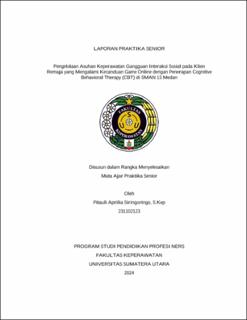Pengelolaan Asuhan Keperawatan Gangguan Interaksi Sosial pada Klien Remaja yang Mengalami Kecanduan Game Online dengan Penerapan Cognitive Behavioral Therapy (CBT) di SMAN 13 Medan
Management of Nursing Care for Social Interaction Disorders in Adolescent Clients Experiencing Game Online Addiction with the Application of Cognitive Behavioral Therapy (CBT) at SMAN 13 Medan

Date
2024Author
Siringoringo, Pitauli Aprilia
Advisor(s)
Purba, Jenny Marlindawani
Metadata
Show full item recordAbstract
Adolescence is a period full of changes because adolescent individuals experience imbalance and instability in emotional aspects, social relationships, and the search for self-identity through changes in social relationship patterns. Social interaction is a dynamic social relationship that refers to the relationship between individuals, individuals with groups, and groups. Dependence on online games is a form of attachment or addiction to online games that can cause social problems such as self-isolation and difficulty in carrying out daily activities. The phenomenon of online gaming provides color for teenagers as active users. Teenagers are so engrossed in playing online games that they often ignore the people around them. Survey results show that more than 50% of online game users are people who are in their teens. Cognitive-behavioral therapy (CBT) is a psychotherapy that changes the process of maladaptive thought patterns (cognitive distortions) and a person's excessive reactions. The goal of CBT intervention is to help individuals transform irrational cognitions into rational cognitions. The methodology used in this senior practice report is a case study with the application of nursing care which includes assessment, problem analysis, nursing diagnosis, intervention formulation, implementation, and evaluation in adolescents. The results obtained from 3 teenage clients who were at SMAN 13 Medan experiencing social interaction disorders due to online game addiction. The focus of the intervention provided is the provision of cognitive behavioral therapy to clients who experience social interaction disorders for 2 days of implementation. Clients who have been given cognitive behavioral therapy experience changes in behavior, affect and emotions that are getting better. This therapy has a positive effect on overcoming individual psychological problems, especially adolescents. It is hoped that all individual components, especially parents and teachers, play an important role in the process of finding adolescent identity at school and at home.
Collections
- Profession of Nursing [370]
